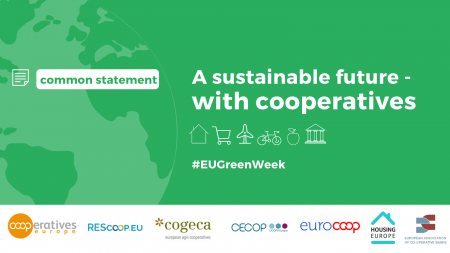
Common statement: A sustainable future – with cooperatives #EUGreenWeek
Scientists say that the next 10 years are critical to minimise the existential threat that climate change and environmental degradation pose to the world. Striving to be the first climate-neutral continent, the European Green Deal is the European Union’s commitment to work towards systemic change, rethinking our ways, striving for innovation and discovering opportunities through sustainability, including jobs and growth in the post-pandemic world.
On the occasion of the 2020 European Green Week (19-22 October) European cooperative movement welcomes this year’s theme titled ‘A new beginning for people and nature,’ and releases its statement on the necessity to consider cooperatives as key partners for the green transition. With sustainability embedded in its business model and governance, the potential of cooperatives in the implementation of the European Green Deal is showcased together with the sectorial members of Cooperatives Europe, including CECOP, EACB, Euro Coop, Cogeca, Housing Europe and REScoop.eu.
Climate action is also the theme of the 2020 International Day of Cooperatives. Cooperatives, through their values and principles are committed to sustainability across their businesses and local communities, leaving no one behind.
Cooperatives are people-centred enterprises that are owned, controlled and run by their members, for their members, to realise their common economic, social and cultural needs and aspirations. As businesses driven by values, not just profit, cooperatives share internationally agreed principles and act together to build a better world through cooperation. Putting fairness, equality and social justice at the heart of the enterprise. Cooperatives around the world are allowing people to work together to create sustainable enterprises that generate long-term jobs and prosperity.
Cooperatives Europe is the cross-sectoral organization that represents +176.000 cooperative enterprises in 34 European countries. Together with our sector organizations CECOP, Cogeca, EACB, Euro Coop, Housing Europe and REScoop.eu, we welcome this year’s Green Week theme “nature and biodiversity”, which is particularly pertinent to attaining the green transition in a way that rebuilds the natural environment to ensure a sustainable for humans and other living beings.
Being prime examples of embedding sustainability in their business model and governance, cooperatives are in pole position to play a key role in the implementation of the European Green Deal, across all sectors of activity:
In the renewable energy sector
The potential of local communities and its citizens to create resilient systems has already been recognised by EU leaders in the Clean Energy for All Europeans Package through the concepts of citizen and renewable energy communities. By investing in and operating clean energy technologies and measures, energy communities are known to strengthen the social and economic welfare of their community whilst taking measures to reduce CO2 emissions and preserve the environment. They hence provide an economically sound model that tackles the exact challenges we need to solve to build a sustainable future for ourselves.
In the industry & services sector
The green transition will be led by radical production transformation. On production processes, the industrial cooperative business model, by its own nature, is able to integrate the circular way of production: the characterising features of the worker cooperative model (capital accumulation, intergenerational transmission, democratic decision making, concern for the community) allows industrial and service cooperatives to be natural drivers of the circular economy.
In the agri-food and forestry sectors
Sustainability is key for European agri-cooperatives’ long-term strategies. These farmer-owned enterprises are catalysts for implementing the Green Deal in the sectors in which they operate. With their investments and market driven strategies, agri-cooperatives allow the deployment of innovative, circular and sustainable actions that address the climate and environmental challenges, while creating economic, social and environmental value for farmers, consumers and rural economies. Agri-coops contribute to the achievement of the 17 UN SDGs.
In the consumer sector
Consumer cooperatives contribute to a balanced and sustainable food supply chain through countless initiatives and best practices, such as expanding assortments of organic products, bold action in fighting food waste and food losses, early adoption of renewable energies and energy efficiency measures, clean transportation, local sourcing and established partnerships with farmers’ communities.
In the banking sector
In Europe regional co-operative banks are a leading source of financing both for smaller and medium sized corporates as well as for households. Thus, they are enablers for key activities in the transition – such as mortgages for energy efficiency, installation of solar panels, biomass power, climatefriendly mobility, etc. More broadly, co-operative banks offer a range of social products. For a “typical” cooperative bank, a relevant part of its activities (measured as a share of the lending book) are in line with the Green and Social bond standards set by the International Capital Market Association (ICMA) and the United Nations’ Sustainable Development Goals, in particular when it comes to finance education, social housing, economic inclusion or social inclusion.
In the housing sector
Housing cooperatives play an important role in delivering economic, environmental and social value for the communities and the local economies in which they operate. They are more likely to invest in energy renovation because of their long-term and non-profit calculation of investments. The “split incentive” dilemma that tends to hinder energy renovation investments in other housing tenures can appear as less relevant for cooperatives. The participative and engaged nature of housing cooperatives opens the opportunity to stimulate sustainable consumption patterns and behaviour amongst their members.
Conclusion Environmental, economic and social sustainability is the only way forward for the European economy. Within the cooperative movement, the environmental awareness and actions are ever growing, making our business model fit for a green and just transition. Cooperative enterprises thus play an important role in delivering economic, environmental and social value for the communities and the local economies in which they operate.
We, at Cooperatives Europe, stand ready to work with stakeholders from all sectors to implement the European Green Deal in a socially inclusive, environmentally sound, truly democratic and economically viable manner. We look forward to working together with you for a better future!
